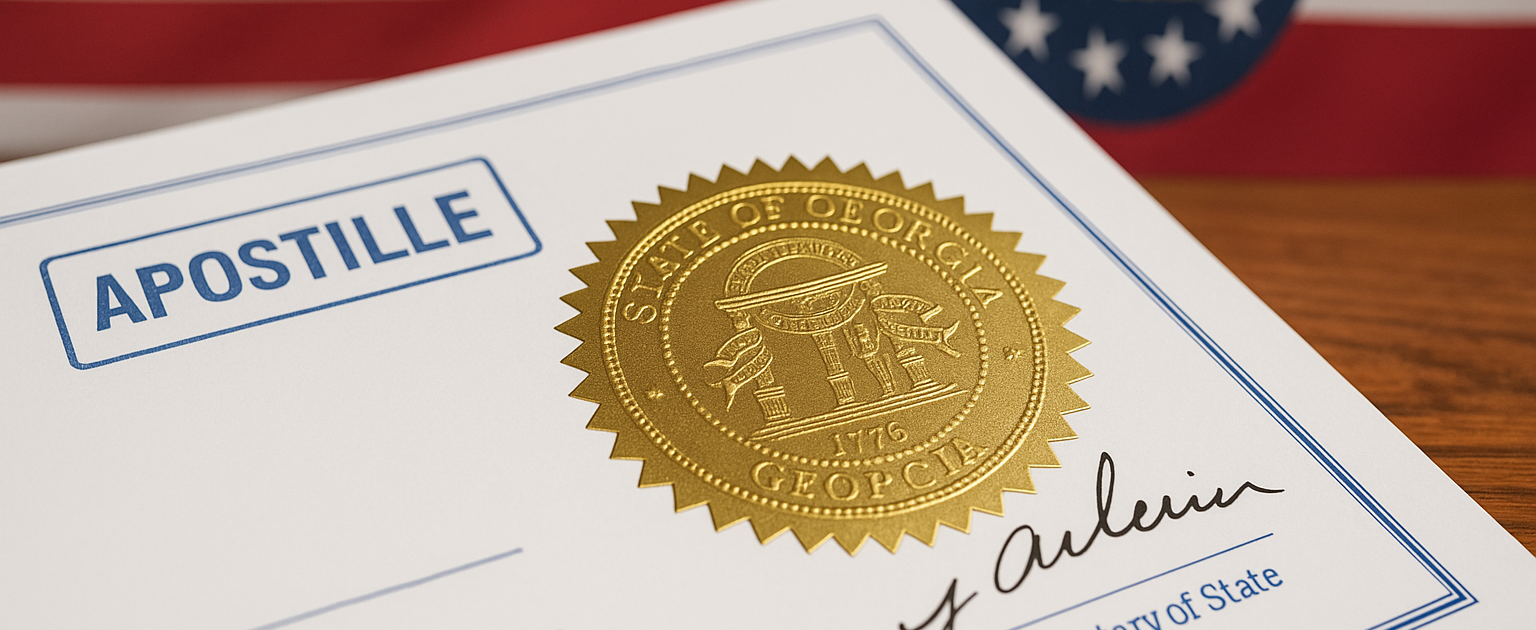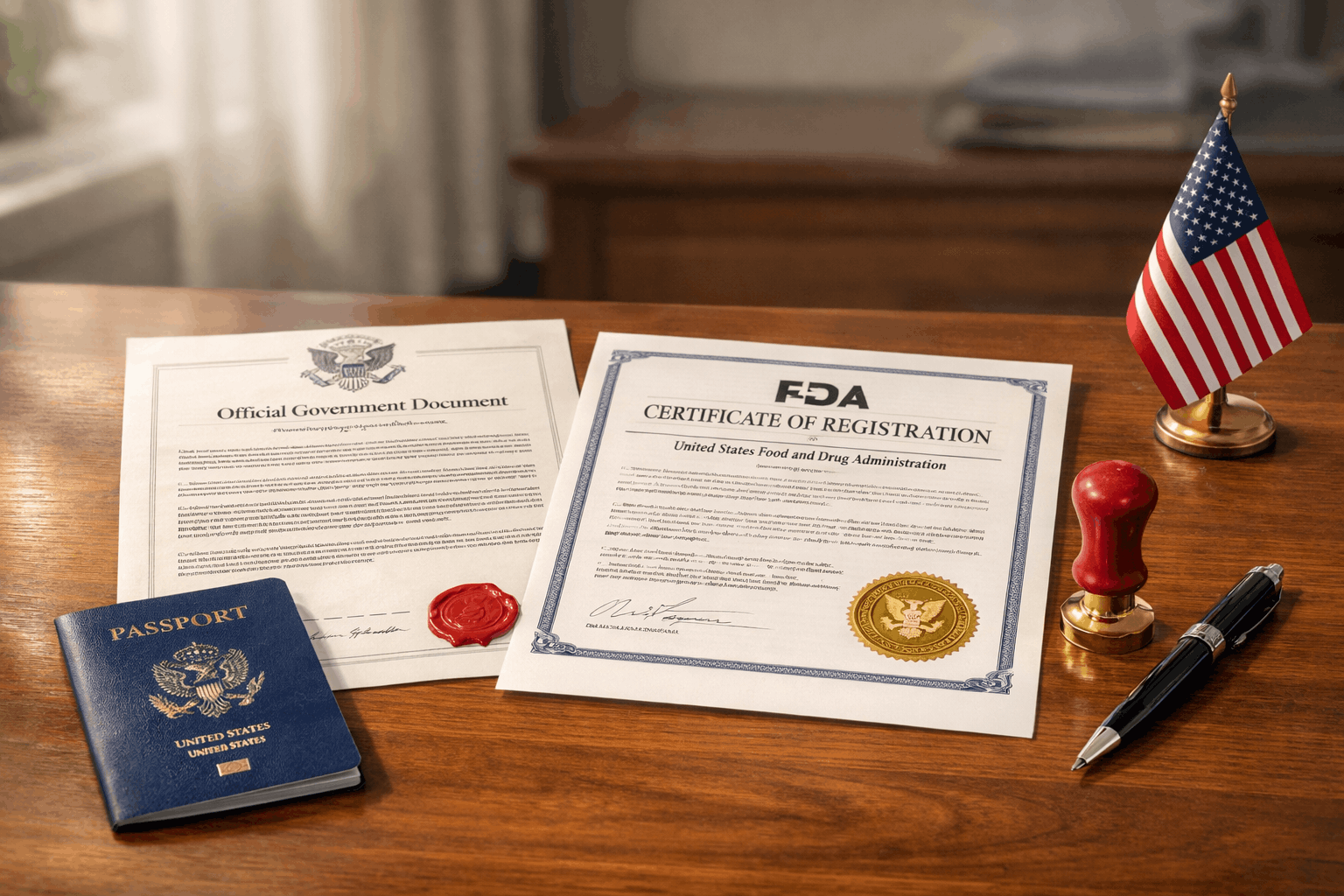
How to get an apostille in Georgia (USA)
For many Georgia residents, handling international documentation feels like a maze—but it doesn’t have to if you know the pathways. Managing paperwork that needs recognition abroad begins with understanding the Georgia apostille process. From what a Georgia apostille is to choosing between DIY and professional apostille services in Georgia, this comprehensive guide outlines the roadmap to global document authentication. Let’s make your papers ready for the world now!
Understanding Apostilles in Georgia
When you intend to use U.S. documents for legal purposes in foreign countries, special authentication is often required for them to be accepted. That’s when an apostille comes in to bridge the gap. It’s typically needed for visas, residency permits, citizenship applications, education credentials, and business agreements.
You’ll obtain a GSCCCA apostille if your destination country is a member of the Hague Convention. Otherwise, another authentication is required as part of consular legalization for non-member countries, known as the Georgia Great Seal. Knowing the difference between these two is crucial to successfully having your paperwork recognized overseas.
Who Issues Apostilles in Georgia — Key Authorities
The Georgia Superior Court Clerks’ Cooperative Authority (GSCCCA) is the only agency responsible for issuing apostilles for notarized or certified documents in the state. All apostille requests—whether vital records, diplomas, or legal papers—must be directed here, as other offices can’t provide the service.
For the Great Seal, or the Georgia Secretary of State certification, the process is handled exclusively by the Secretary of State’s office. Don’t get baffled between these issuing authorities—sending a request to the correct place ensures your documents meet global standards without delays.
Eligible Documents for Apostille
Various documents qualify for a Georgia apostille, supposing that they are originals or notarized and certified copies. Regularly seen categories include:
- Vital records: Official certified copies of birth certificates, marriage licenses, and death certificates.
- Legal document: Court orders, divorce decrees, state-issued background checks, and other judicial records.
- Corporate documents: Articles of incorporation, board resolutions, powers of attorney, and other business-related paperwork.
- Other documents: Academic diplomas, transcripts, affidavits, authorization letters, and other notarized personal documents.
In short, all public records and state-notarized documents can be apostilled. Remember to follow notarization or certification guidelines before proceeding.
Step-by-Step Process to Obtain an Apostille in Georgia
Wondering how to get an apostille in Georgia? You’re in the right place. The procedure can be broken down into four steps, which are surprisingly manageable. From document preparation to final delivery, we’ll cover each phase, including submission methods, processing fees, and timelines, so you know what to expect.
Step 1 – Prepare Your Document
Begin by checking if your paperwork is eligible for the apostille. To be accepted for authentication, the document must either be a certified copy or properly notarized. For instance, a certified copy of the birth certificate should be obtained from the Vital Records office, Georgia Department of Public Health, instead of a hospital record. Likewise, affidavits and sworn statements must be notarized by a state-commissioned notary public.
Step 2 – Choose Your Submission Method
The GSCCCA allows two submission methods: in-person or by mail. A mailed package should contain your prepared documents, completed request form, required fee, and a self-addressed envelope for return. You can drive by the Atlanta office and hand submit your apostille request for faster processing. Select the most convenient option based on your timeline and location for a hassle-free trip abroad.
Step 3 – Payment & Fees Breakdown
The current fee charged by the GSCCCA is $3.00 per document. Payment options include cash, check, money order, or credit card at the office. For mail-in, attach a check or money order to the package with the correct amount and make it payable to the GSCCCA. Both submission methods also accept the new credit card pre-payment voucher system, which allows for payments in advance by personal and business credit cards with a billing address in the U.S. or Canada.
Step 4 – Processing Time and What You’ll Receive
Once submitted, requests are processed on the same day for hand delivery or one to two business days for the mail-in service, excluding transit time. You’ll receive the apostille attached to your document, verifying its authenticity for use in the designated Convention country. Now, it’s time to bring the document abroad!
Common Georgia Apostille Challenges and Solutions
Hurdles can arise unexpectedly when getting a Georgia apostille, even if you adhere to the guidelines all along. In this part, let’s reveal some of the most frequent obstacles—rejection issues, multi-state complexities, or foreign country requirements—and suggest practical solutions to keep you on track.
Document Rejection Issues
The first setback that usually happens is document rejection. This might result from submitting an uncertified photocopy, an improperly notarized document, or paperwork lacking clear signatures and seals. The solution is to always double-check document quality to ensure it fulfills GSCCCA standards before submission. A small oversight causes costly holdups—so attention to detail is key.
Out-of-State Document Complications
Official documents issued outside Georgia can’t receive a GSCCCA apostille. Each state handles the apostille process independently, so attempting to authenticate a Florida birth certificate in Georgia will lead to outright rejection. If your papers are from another state, they must be authenticated in the state of origin. Contact the relevant Secretary of State to consult about the procedures instead.
International Destination Requirements
Different countries, even those under the Hague Convention, may have their specific rules that many fail to acknowledge. Some mandate certified translations into the local language, while others demand additional certification. Therefore, it’s best to research the destination country’s authentication protocol before proceeding with the apostille to ensure you don’t miss any details that may derail your plan.
Professional Services vs DIY Approach
Now that you know the process and potential challenges, should you handle the authentication yourself or hire an expert? To answer that, we’ll explore the pros and cons of each to help you decide what works for your situation, deadline, and budget.
When to Handle It Yourself
The DIY approach is perfect for you if you’re flexible about timing, acquainted with government paperwork, and dealing with simple documents. This typically means you have the required certified copies issued in Georgia and feel comfortable to submit the request on your own. Follow the GSCCCA guidelines carefully and cross-check the receiving country’s laws. DIY is a cost-effective option when you can navigate instructions confidently without time constraints.
Benefits of Professional Apostille Services
Expert apostille services in Georgia offer a state-of-the-art approach to document authentication, guaranteeing convenience, speed, and peace of mind. The pros assist you from start to end, including document preparation, notarization, submission, and approval delivery. Their support is especially helpful when you’re dealing with multi-state documents or tight deadlines. This is a value investment for those busy with life or just don’t want to tackle the paperwork by themselves.
Attention to Details Provides an Apostille in Georgia
Securing an apostille in Georgia is easier than ever with our exhaustive guide. The key to international acceptance is attention to detail and thorough preparation, whether you choose the DIY route or enlist a trusted provider. Keep in touch with us to stay informed of the latest apostille and legalization updates in Georgia!
FAQ
Can I get a Georgia apostille if I don’t live in Georgia?
Absolutely. Residency doesn’t matter if your document was issued or notarized in Georgia. You can mail your apostille request to the GSCCCA from anywhere.
What’s the difference between GSCCCA apostilles and Georgia Secretary of State Great Seal certifications?
The GSCCCA apostilles apply to Hague member countries, while the Great Seal works for documents that go through legalization for use in non-member countries.
Can Georgia apostille documents from other states?
No, Georgia can only authenticate those that were issued within the state.
What happens if my apostille application is rejected?
You’ll get a notice explaining the reasons for rejection, and you can correct errors to resubmit your application after that.
How long does it take to get an apostille in Georgia?
Really fast compared to other states. Processing typically takes 1-2 business days, excluding shipping time; walk-in submissions may be completed the same day.
What documents are most commonly apostilled in Georgia?
Birth certificates, marriage licenses, school diplomas, powers of attorney, and business contracts are among the most frequently apostilled papers.
Can I track my apostille request?
Tracking isn’t offered by the GSCCCA, but you can use a traceable courier service to receive updates on delivery status.





